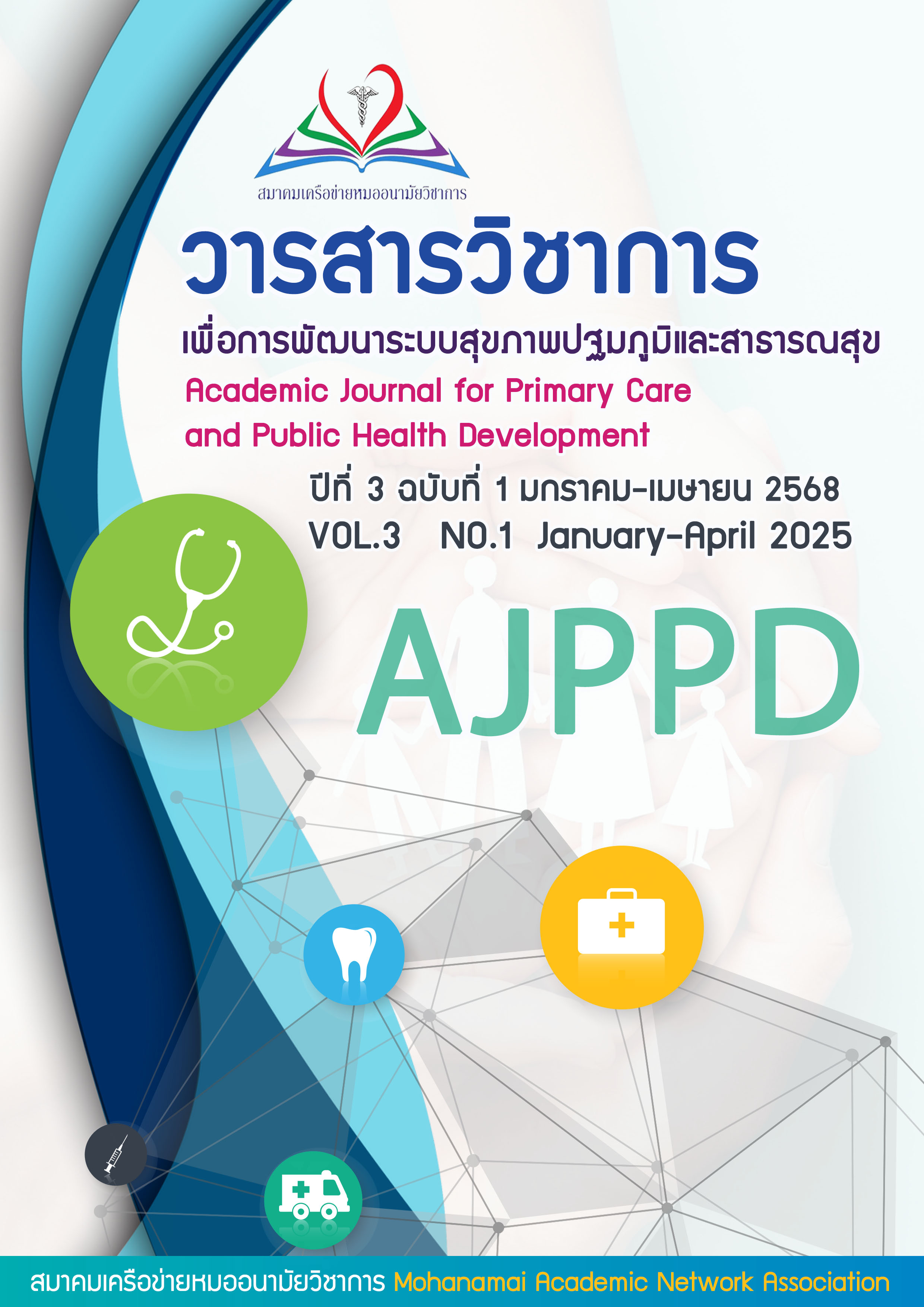The Effects of Physical Activity Promotion Program by Applying Self-Efficacy Theory with Elderly Person in Phak Khuang Health Promotion Hospital, Thong Saen Khan, Uttaradit Province
Keywords:
physical activity, self-efficacy, elderlyAbstract
This research aimed to study and compare the effects of a physical activity promotion program based on self-efficacy theory among elderly people regarding knowledge, self-efficacy perception, outcome expectations, physical activity levels, and physical fitness. A quasi-experimental one-group pretest-posttest design was employed. The sample consisted of 25 elderly individuals aged 60-69 years from the service area of Phak Khuang Health Promotion Hospital, Thong Saen Khan District, Uttaradit Province, selected by purposive sampling according to specific criteria. The research instruments included: (1) an 8-week physical activity promotion program based on Bandura's self-efficacy theory, (2) questionnaires measuring knowledge, self-efficacy, outcome expectations, and physical activity, and (3) physical fitness assessment tools. Data were analyzed using descriptive statistics and a dependent t-test.
The results showed that after the experiment, the elderly participants had significantly higher mean scores in knowledge about physical activity (p=0.003), self-efficacy (p=0.006), and outcome expectations (p=0.002). Regarding physical activity, there were significant increases in walking or cycling (p=0.004) and recreational activities of both vigorous (p=0.001) and moderate intensity (p=0.002), while sedentary behavior decreased significantly (p=0.022). Physical fitness improvements were observed in respiratory and cardiovascular capacity (p=0.002), muscle strength (p<0.001), and balance and agility (p<0.001). These findings demonstrated that promoting physical activity by applying self-efficacy theory was effective in comprehensively developing knowledge, self-efficacy, physical activity levels, and physical fitness among the elderly. The program integrated knowledge provision, creation of mastery experiences, use of role models, and verbal persuasion, along with practical training based on FITT principles and sensorimotor training.
References
กรมกิจการผู้สูงอายุ กระทรวงการพัฒนาสังคมและความมั่นคงของมนุษย์. (2564). คู่มือระบบดูแลและคุ้มครองพิทักษ์สิทธิผู้สูงอายุในระดับพื้นที่. https://www.dop.go.th/download/knowledge/th1561080125-196_0.pdf
กองกิจกรรมทางกายเพื่อสุขภาพ กรมอนามัย กระทรวงสาธารณสุข. (ม.ป.ป.). ข้อแนะนำการส่งเสริมกิจกรรมทางกาย การลดพฤติกรรมเนือยนิ่ง และการนอนหลับสำหรับผู้สูงวัย (ตั้งแต่ 60 ปี ขึ้นไป). บริษัท เอ็นซี คอนเซ็ปต์ จํากัด.
โครงการสุขภาพคนไทย. (2562). สุขภาพคนไทย 2562 (หน้า 32-34). สถาบันวิจัยประชากรและสังคม มหาวิทยาลัยมหิดล.
นพนัฐ จำปาเทศ และคณะ. (2561). บทบาทพยาบาลในการประยุกต์ใช้ทฤษฎีการรับรู้ความสามารถของตนเองในผู้สูงอายุที่เป็นเบาหวาน. วารสารพยาบาลทหารบก, 20(2), 60-72.
วิมล ปักกุนัน และรุจิรา ดวงสงค์. (2563). ผลของการส่งเสริมกิจกรรมทางกายของผู้สูงอายุโดยประยุกต์แนวคิด ความรอบรู้กิจกรรมทางกาย คลินิกส่งเสริมสุขภาพผู้สูงอายุ ศูนย์อนามัยที่ 7 ขอนแก่น อำเภอเมือง จังหวัดขอนแก่น. วารสารวิจัยสาธารณสุขศาสตร์ มหาวิทยาลัยขอนแก่น.
สำนักส่งเสริมสุขภาพ กรมอนามัย กระทรวงสาธารณสุข. (2557). โครงการสำรวจสุขภาวะผู้สูงอายุไทยปี 2556 ภายใต้แผนงานส่งเสริมสุขภาพผู้สูงอายุและผู้พิการ. โรงพิมพ์วัชรินทร์ พี.พี.
American College of Sports Medicine. (2020). ACSM's guidelines for exercise testing and prescription (11th ed.). Wolters Kluwer.
Bandura, A. (1997). Self-efficacy: The exercise of control. W.H. Freeman.
Erickson, K. I., Hillman, C., Stillman, C. M., Ballard, R. M., Bloodgood, B., Conroy, D. E., Macko, R., Marquez, D. X., Petruzzello, S. J., & Powell, K. E. (2020). Physical exercise increases brain plasticity in late adulthood. Frontiers in Aging Neuroscience, 12, 318. https://doi.org/10.3389/fnagi.2020.00318
Lo, S. W. S., Chair, S. Y., & Lee, F. K. (2015). Factors associated with health-promoting behavior of people with or at high risk of metabolic syndrome: Based on the health belief model. Applied Nursing Research, 28(2), 197-201.
McAuley, E., Blissmer, B., Marquez, D. X., Jerome, G. J., Kramer, A. F., & Katula, J. (2003). Physical activity, self-efficacy, and quality of life in older adults. Journals of Gerontology, 58B(4), P268-P275. https://doi.org/10.1093/geronb/58.4.P268
Perkins, J. M., Multhaup, K. S., Perkins, H. W., & Barton, C. (2008). Self-Efficacy and Participation in Physical and Social Activity Among Older Adults. The Gerontologist, 48(1), 51–58. https://doi.org/10.1093/geront/48.1.51
World Health Organization. (2010). Global recommendations on physical activity for health.

Downloads
Published
How to Cite
Issue
Section
License

This work is licensed under a Creative Commons Attribution-NonCommercial-NoDerivatives 4.0 International License.





